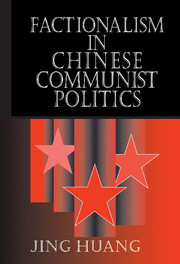Book contents
- Frontmatter
- Contents
- List of Figures and Tables
- Preface
- List of Abbreviations
- Introduction
- 1 Factionalism, the Puzzle of Chinese Communist Politics
- 2 Factionalism and the Political System in China
- 3 The Establishment of the Yan'an Round Table
- 4 The Transition of the Yan'an Round Table
- 5 Crises in Leadership Relations with the Two-Front Arrangement
- 6 The Collapse of the Yan'an Round Table and the Unleashing of Factionalism
- 7 Deng Xiaoping's Dominance: Factionalism Prevails over the Party Spirit
- 8 Conclusion
- Selected Bibliography
- Index
Introduction
Published online by Cambridge University Press: 11 September 2009
- Frontmatter
- Contents
- List of Figures and Tables
- Preface
- List of Abbreviations
- Introduction
- 1 Factionalism, the Puzzle of Chinese Communist Politics
- 2 Factionalism and the Political System in China
- 3 The Establishment of the Yan'an Round Table
- 4 The Transition of the Yan'an Round Table
- 5 Crises in Leadership Relations with the Two-Front Arrangement
- 6 The Collapse of the Yan'an Round Table and the Unleashing of Factionalism
- 7 Deng Xiaoping's Dominance: Factionalism Prevails over the Party Spirit
- 8 Conclusion
- Selected Bibliography
- Index
Summary
FACTIONALISM IN LEADERSHIP RELATIONS AND DECISION MAKING
Factionalism, a politics in which informal groups, formed on personal ties, compete for dominance within their parent organization, is a wellobserved phenomenon in Chinese politics. In addition to frequent references to factional activities in the literature, a few studies focus on this topic specifically: Andrew Nathan explores factionalism in Chinese Communist Party (CCP) politics in terms of clientalism; William Whitson attributes factional tendencies in the military to the CCP's Field Army system during the war; Lucian Pye elucidates factionalism from the perspective of Chinese political culture; and Frederick Teiwes depicts the 1954 Gao-Rao Affair as essentially an outcome of factional struggles among the elite members.
The study of factionalism in CCP politics, however, remains strikingly deficient. There are few thorough and systematic examinations of how factionalism has developed in CCP politics. Theoretically, it is hard to imagine how factions, which tend to divide the Party, can exist in the CCP, not necessarily because the CCP leadership has always vowed to eliminate factional activities in the Party, but because the CCP is a Leninist party, the unity of which is vital for its rule. More pragmatically, if factionalism forms the essential dynamics in the policy process, how can we distinguish a genuine policy dispute from the unprincipled factional conflicts? Or, as some may suggest, if the two entangle, to what extent can factional activities affect a policy outcome, or vice versa? Furthermore, how can factionalism affect the overall political development in China?
- Type
- Chapter
- Information
- Factionalism in Chinese Communist Politics , pp. 1 - 25Publisher: Cambridge University PressPrint publication year: 2000
- 1
- Cited by

